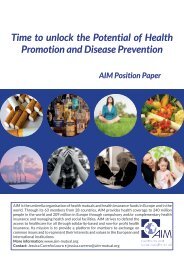Exploring patient participation in reducing health-care-related safety risks
Exploring patient participation in reducing health-care-related safety risks
Exploring patient participation in reducing health-care-related safety risks
You also want an ePaper? Increase the reach of your titles
YUMPU automatically turns print PDFs into web optimized ePapers that Google loves.
<strong>Explor<strong>in</strong>g</strong> <strong>patient</strong> <strong>participation</strong> <strong>in</strong> reduc<strong>in</strong>g <strong>health</strong>-<strong>care</strong>-<strong>related</strong> <strong>safety</strong> <strong>risks</strong><br />
144<br />
<strong>in</strong>volvement <strong>in</strong> <strong>safety</strong> issues <strong>in</strong>, for <strong>in</strong>stance, the area of medication <strong>safety</strong>. Yet <strong>patient</strong>s<br />
often lack the most basic <strong>in</strong>formation about the medic<strong>in</strong>es they are tak<strong>in</strong>g (see the section<br />
on the micro level below).<br />
Box 8 .1 . The limits of the law<br />
Chapter 4 (Blood transfusion <strong>safety</strong> <strong>in</strong> France)<br />
» Despite the law, <strong>patient</strong>s and the general public mostly ignore their rights.<br />
Even though written <strong>in</strong>formation is compulsory by law, the written form is not systematically provided by<br />
prescribers of blood transfusion. Prescribers, but also <strong>patient</strong>s, expressed their preference for oral <strong>in</strong>formation.<br />
Chapter 5 (Patient <strong>safety</strong>, rights and medication <strong>safety</strong> <strong>in</strong> primary <strong>care</strong> <strong>in</strong> Poland)<br />
» Doctors are legally obliged to report ADRs to the National Bureau for Registration of Medic<strong>in</strong>al Products.<br />
However, 74% of the primary <strong>care</strong> doctors <strong>in</strong>volved <strong>in</strong> the survey had never reported an ADR at the time<br />
at which it occurred.<br />
Chapter 6 (Patient engagement <strong>in</strong> elective surgery <strong>safety</strong> <strong>in</strong> Portugal)<br />
» Informed consent application differs among <strong>health</strong> <strong>care</strong> providers. Thirty per cent of <strong>patient</strong>s <strong>in</strong> the surgery<br />
unit of a Portuguese hospital had not received <strong>in</strong>formation about other treatment options.<br />
One of the problems <strong>in</strong> relation to implementation of <strong>patient</strong>s’ rights is that <strong>patient</strong>s<br />
are often dependent on providers to effect and enforce their rights. If <strong>patient</strong>s’ rights are<br />
not mirrored by providers’ obligations, difficulties may arise. As discussed <strong>in</strong> Chapter 1,<br />
the Hippocratic Oath forms a good start<strong>in</strong>g po<strong>in</strong>t <strong>in</strong> the development of professionals’<br />
codes with respect to <strong>patient</strong> <strong>safety</strong>. Accord<strong>in</strong>g to Legemaate (Chapter 2), professional<br />
obligations and standards <strong>in</strong>clude the rights of <strong>patient</strong>s as well as the prevail<strong>in</strong>g norms<br />
regard<strong>in</strong>g the quality and <strong>safety</strong> of <strong>care</strong>. Present-day professional obligations of <strong>health</strong><br />
professionals <strong>in</strong>clude a will<strong>in</strong>gness to report <strong>in</strong>cidents and adverse events and to<br />
otherwise participate <strong>in</strong> activities and systems to improve the quality and <strong>safety</strong> of <strong>care</strong>.<br />
Similarly, <strong>patient</strong>s’ right to <strong>in</strong>formation is reflected <strong>in</strong> professional codes, such as the<br />
Portuguese Medical Association’s ethical code (see Chapter 7). Accord<strong>in</strong>g to Article<br />
44 of this code: “[T]he <strong>patient</strong> has the right to receive and the physician the duty to<br />
provide clarification on the diagnosis, treatment and prognosis of his disease”.<br />
However, if a <strong>health</strong> professional does not have sufficient communication skills or views<br />
the duty to <strong>in</strong>form the <strong>patient</strong> as a non-medical but legalistic obligation, the goals<br />
embodied <strong>in</strong> the rights of <strong>patient</strong>s will not be adequately met (Legemaate, Chapter 2).<br />
In most of the chapters of this report, therefore, recommendations are made with respect<br />
to the curricula and CME of professionals (Box 8.2).<br />
Meso level<br />
The meso level <strong>in</strong>volves <strong>health</strong> <strong>care</strong> <strong>in</strong>stitutions, such as hospitals. The primary<br />
obligation and responsibility for quality and <strong>safety</strong> lies at this level. As Legemaate argues<br />
<strong>in</strong> Chapter 2, <strong>health</strong> <strong>care</strong> <strong>in</strong>stitutions should facilitate <strong>health</strong> professionals to respect<br />
<strong>patient</strong>s’ rights and fulfil their other professional obligations; they should put <strong>in</strong> place<br />
an effective and comprehensive <strong>safety</strong> management system <strong>in</strong> which there is room to<br />
<strong>in</strong>corporate <strong>in</strong>formation obta<strong>in</strong>ed from <strong>patient</strong>s and their organizations. Kutryba also<br />
recommends <strong>in</strong>volv<strong>in</strong>g <strong>patient</strong> organizations <strong>in</strong> provid<strong>in</strong>g the appropriate developments,<br />
skills, knowledge, empowerment and encouragement for <strong>patient</strong>s (Chapter 5).



